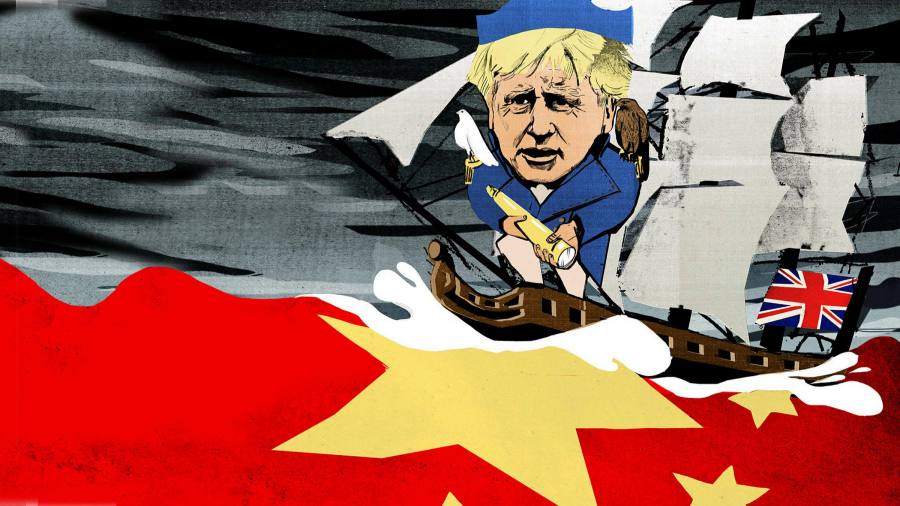[ad_1]
A coherent foreign strategy ought to demand a clear China policy. But, as the UK prepares to publish its long-overdue defence, security and foreign review, what would seem to be an essential element is intentionally shrouded in contradictions.
For one Conservative critic, “There is absolutely no strategyâ€. Boris Johnson is under pressure from Tory MPs who want a more hardline stance in the face of increased assertiveness and the “Made in China 2025†vision of securing global, technological dominance.Â
In fact, the contradictions are the strategy. The stance has hardened since the vision of the UK as China’s closest friend in the west, but Johnson, who sees himself as a Sinophile, wants to limit the froideur. While prioritising resilience of national supply chains (code for ending dependence on potentially hostile nations), he does not want to jeopardise Chinese investment and trade. He depends on China’s technology to deliver his green strategy. Tough talk on human rights is the red meat thrown to his hawks to limit more economically damaging demands. In the words of one minister the goal now is to keep the economic and diplomatic issues on “different tramlinesâ€.
But if hawkish Conservative MPs pose one threat to this, another comes from the new narrative the government is weaving around its post-Brexit foreign policy in which China is the obvious antagonist. Alongside the emphasis on national resilience is a strategic tilt towards the Indo-Pacific region. It is there that the UK sees both commercial opportunities and the chance to place itself at the centre of a web of commercial and diplomatic alliances based on democracy and the liberal order.
Post-Brexit, Johnson needs a new story to tell of Britain’s place in the world. Hence the emphasis on the tilt. The UK, like the naval power its prime minister so obviously wishes it still was, is reviving the spirit of the merchant adventurers and heading east in search of new markets and influence.
Key components include a push to join the CPTPP free trade agreement, which offers commercial benefits and gives the UK a seat at a new table — one which joins the Americas and Asia. Alongside this is the UK’s move to turn the next G7 meeting into a “D10†by inviting the three leading democracies of India, Australia and South Korea. Strengthening trade and diplomatic ties with India, which Johnson will woo in a looming high-profile visit, is key to the UK’s strategy. A further show of commitment will see Britain’s new aircraft carrier heading to the Pacific for military exercises, though this is more performative than significant.
Ideally this is a virtuous circle. The emphasis on a rules-based order is seen as a competitive commercial advantage. British values are being sold as a service.
For many, the tilt is a triumph of storytelling over reality. The UK is not a key player in the Pacific and a strategy for the democratic world must be shaped by the US and include the EU. India’s democratic credentials are increasingly in question. But stories have power and the unifying theme of the strategy is that the UK is selling itself as an ally in the struggle against an overmighty China.Â
Human rights and even the strong UK support for Hong Kong British nationals may be kept on a different tramline, but the liberal alliance looks designed to check Chinese ambitions. Part of the UK’s resilience strategy is to ensure democratic nations develop tech champions to prevent reliance on China.
In the UK, the new National Security Investment Bill will make it easier to block takeovers. Ministers are also looking at the impact of Chinese investment in universities both in terms of access to cutting edge research and using funding to silence critics. The next battle may be over continued Chinese involvement in the nuclear industry.
But Johnson sees the risks. Having cut access to its largest market, the UK cannot afford to close off others. China is still home to the Department for International Trade’s largest overseas mission. The City of London wants to retain its status as a leading hub for renminbi trading. “We can’t shut ourselves off from Chinese investment,†says one senior minister.
On human rights, the approach has often been more callout than cancel. Britain condemned the persecution of Uighurs and announced restrictions on trade with Xinjiang. But it stopped short of invoking Magnitsky sanctions and fought a wider move to block trade deals with any country deemed guilty of genocide — a move aimed squarely at China. The tactics, then, are to restrain the hawks, try to compartmentalise issues and hope for Chinese forbearance.
Having bowed to the Conservative China Research Group in its fight to force China’s Huawei out of the 5G network, Johnson is now battling to contain his hawkish MPs. “You can’t keep feeding the crocodile,†says one minister.
This Janus-faced approach is prudent, but it is hard to see how it is sustainable. The barriers to Chinese investment and the new narrative of Global Britain set the UK up as a player in the battle to contain China. This is where the conflicting diplomatic and economic tramlines collide.
The UK is endeavouring to maintain a strategy of conflicting priorities, still being open for Chinese business while weaving a story which places it at the epicentre of the fight for the liberal order. Either the narrative is less than billed or one of these two policy goals is going to have to give.
[ad_2]
Source link





